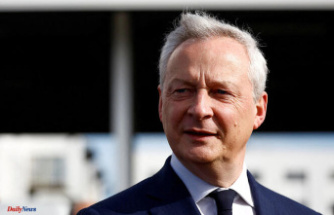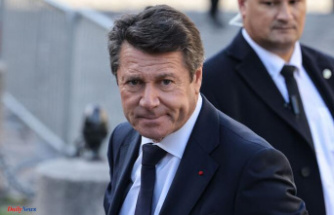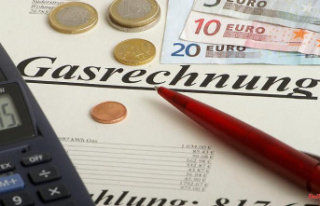The traffic light invites Germany to travel cheaply on buses and trains for three months. But while the governing parties have long been arguing about a successor to the 9-euro ticket, initial results are mixed at best. What may make sense from a socio-political point of view only helps the climate to a limited extent.
Anyone who wants to evaluate the meaning and benefit of the 9-euro ticket has to answer three questions: What did it bring to consumers? What contribution has it made to the mobility revolution and the reduction of CO2 emissions? And what is the relationship between these effects and the immense costs of 2.5 billion euros?
The problem: These questions are answered very differently depending on the interests of those involved. After all, the instrument was invented primarily as a remedy against the rapidly rising and still rising cost of living. The hoped-for contribution to accelerating the turnaround in mobility was more of a kind of side effect. In the debate on how to proceed in local and regional transport, the actual effects of the 9-euro ticket are interpreted and weighted according to their own interests: the transport companies want more money for a reasonable range of journeys in the long term. The states, which order local transport, also want that, but above all they want the money to come from the federal government and not from their own, mostly cash-strapped coffers.
The federal government, in turn, sees the states as having an obligation, but is almost as inconsistent on this issue as the 16 federal states, because the three governing parties, for their part, pursue conflicting interests: the SPD is primarily concerned with the social question, the Greens want that push back individual car use and the FDP does not want to turn on the money tap any further, whereby Federal Minister of Finance Christian Lindner also suspects the 9-euro ticket stock of a "free mentality" contrary to him. You have to keep that in mind when you read and hear the respective statements on the subject.
There is some clarity as to whether the offer was accepted: Yes. The Association of German Transport Companies (VDV) assumes 30 million users per month, including monthly and annual subscriptions. According to market research commissioned specifically for this purpose, ten percent of the users of the 9-euro ticket said they forgo one of their daily journeys by car or motorbike. This corresponds to a decrease of 4 percent compared to May of this year. It is numbers like this that tempt many politicians and representatives of associations to rate the 9-euro ticket as a success.
These people also have to admit that the increased demand has sometimes led to unpleasant experiences and a lot of frustration, especially in regional train traffic. Images of chaotic conditions at city train stations and overcrowded trains have abounded in recent weeks. Holiday and excursion plans failed because the bicycles could not be taken or the trains did not run at all. Anyone who commutes professionally between a touristically attractive place and a larger city was often pinched.
A closer look at the figures reveals a differentiated picture. According to the "Süddeutsche Zeitung", the Bayerische Regiobahn, which brings many people from the surrounding areas to the cities, reports an increase in demand of up to 60 percent. In the Berlin-Brandenburg transport association, where public transport use is already high in Berlin, capacity utilization rose by at least 25 percent.
Elsewhere, the numbers are less impressive: "We saw an increase in passengers of 15 percent compared to the same period in 2019 - i.e. before the pandemic. That's relatively little for the high financial effort behind it," says Lars Boehme, Managing Director of Uckermärkische Transport company (UVG), to ntv.de. The UVG, which operates dial-a-bus and scheduled buses in the sparsely populated north of Brandenburg, attributes the growth primarily to tourist use as well as shopping and leisure trips. "There was no better offer for commuters. If I can't get to and from work reliably, even a 0-euro ticket is of little use to me," says Boehme.
The usage analysis also points to two equally serious problems on the way to the mobility turnaround, which the 9-euro ticket does not change either: In the metropolitan regions and on connections relevant to tourism, passengers experienced how badly there is a lack of capacity. Those who switched from their car for the first time were probably not persuaded to leave their car behind, even if the ticket costs were higher. The rail unions EVG and GdL complained that the employees in rail traffic, who already often walked with canes, were overburdened. Meanwhile, residents of rural regions, where the bus runs every hour at best, but even then not at off-peak times, still had no practicable alternative to their own car on the way to work.
The problem: Both phenomena - the lack of capacity here, the lack of supply there - threaten to worsen in the coming years. "The shortage of skilled workers is increasing and means a challenge that has to be solved - namely to fill around 74,000 vacancies due to age in public transport alone by 2030 and, above all, to find the forecast 110,000 new employees that we are urgently looking for for the mobility turnaround," reports the VDV . "The same applies to the personnel requirements for rail transport." It also suffers from ailing rail infrastructure and a lack of trains, and many transport companies will have to convert their bus fleets to alternative drives such as hydrogen in the foreseeable future.
All of this will cost money, while transport companies are also groaning under energy prices. The Verkehrsverbund Oberelbe warned on Thursday that every third regional connection in Saxony would be canceled and a price increase of 15 percent unless more money came from the state and/or federal government. The 2.5 billion euros for the 9-euro ticket are already gone. "With this large sum of money, one could have created a more attractive offer in rural areas in the long term. This would also have made it easier to develop metropolitan regions," UVG Managing Director Boehme points out. As it is, however, the money from all taxpayers has benefited the half of Germany that lives in the metropolitan regions for a one-off effect.
The environmental effect is also controversial. The VDV calculates that the projected renunciation of 100 million car journeys per month led to savings of 180 million tons of CO2 within three months - as much as a general speed limit on German motorways within a year. One could argue that the latter would be available free of charge - except for Chancellor Olaf Scholz, who would not have a government majority without the self-declared FDP motorists' party.
Researchers at the RWI Leibniz Institute estimate the climate effect to be significantly lower. They estimate the savings at 205,000 to 671,840 tons of CO2, as RWI researcher Marc Andor said on Thursday at an online event of the climate think tank Agora Energiewende. The demand for the ticket was high. "However, we see that the car routes have only been slightly replaced and that this is unlikely to be cost-effective, at least as a short-term climate protection measure." Overall, only 8 percent of new buyers, who previously did not have a subscription, would have used the 9-euro ticket to get to work. Andor announced further research into whether the simultaneous fuel discount has thwarted efforts to increase public transport use.
This week, Scholz described the 9-euro ticket as "one of the best ideas we had" - also knowing that economists praised the positive effect of the measure on consumers' wallets, which were battered by energy prices. However, he does not derive a continuation from this. Transport Minister Volker Wissing from the FDP is now to examine, together with the 16 federal states, how "convenience, usability, perhaps also affordability" in local public transport can be better regulated. The chancellor suspects that if Wissing and Lindner open the box for regional and local public transport at all, it will be more for long-term investments in the offer.
The 9-euro ticket brought an undisputed advantage: For the first time, passengers could ignore the limits of their transport associations and travel across the country for a flat rate without having to worry about fare zones or third-party ticket machines. This idea has also arrived in politics. "When the complicated fare zones disappear and the tickets are valid nationwide, public transport will be used much more," said Wissing back in July. So far, however, his company has not found a connection solution that would make this possible.
The FDP recently showed sympathy for a 69-euro ticket, which would cost around 2 billion euros a year. The Greens, on the other hand, want a much cheaper successor to the 9-euro ticket. "We have put a very specific proposal on the table," said Green Group Vice President Andreas Audretsch ntv. "29 euros for the region, 49 euros for the whole of Germany." According to figures from the RWI Leibniz Institute, 52 percent of buyers said they would continue to use the 9-euro ticket. At 29 euros it would still be 26 percent and at 69 euros only 4 percent, as Andor said at the Agora event.
In case of doubt, lower prices remain a matter for the federal states, which can use their own and federal funds autonomously. In Berlin, for example, the Senate is examining spending unexpected additional income for a new 9-euro ticket in November and December. The Berlin considerations are primarily of a socio-political nature, because low and normal earners, who mainly use buses and trains, are to be supported in dealing with inflation and energy prices. The new 9-euro ticket would initially be of little use for the expansion and modernization of Berlin's public transport services. But, according to the first cautious assessment, it is perhaps not the most suitable means.












